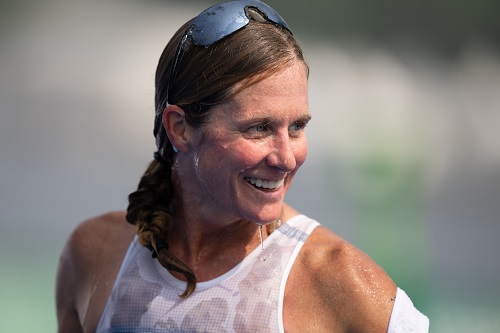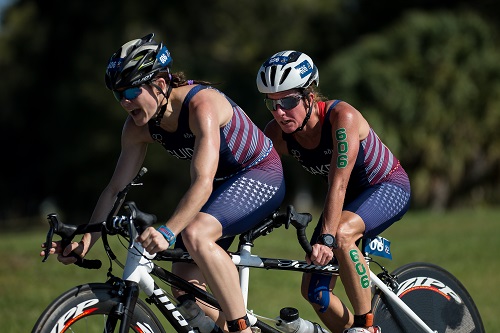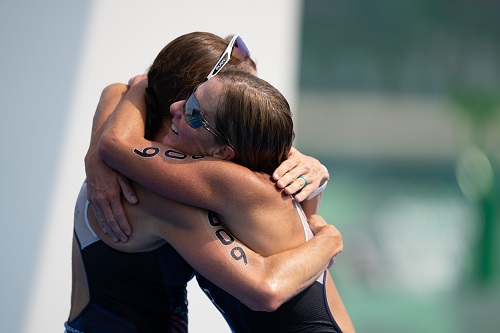Most high-level athletes end their careers at the age of 40, or even before. But for Elizabeth Baker, that’s when it really started. And her journey has been nothing short of remarkable.
Baker was 40 when she competed in her first Ironman competition, winning her division. A few years later, she represented the United States in the debut of the paratriathlon at the 2016 Paralympic Games in Rio de Janeiro, finishing fourth. Baker competed again in the 2020 games in Tokyo.
As a teenager, she had vision issues and struggled to read the eye chart. It wasn’t until she was 15 that a doctor found scarring on her retina. A specialist would diagnose her with Stargardt disease, a rare children’s version of macular degeneration.
“At that point, my vision was probably still 20/60. I got a normal driver’s license at the age of 16 and I was able to get into the University of Georgia and go off to Georgia as a freshman,” said Baker. “But when I was a freshman, I had a steep decline because with Stargardt disease. You usually have one major decline and then you trickle down through your life. I went from probably 20/60 to almost 20/200 in both eyes.”
Baker said due to the disease, she has lost most of her central vision and finds it difficult to differentiate between people’s faces. She even struggles picking her own children out of a crowd and has occasionally gone up to the wrong man, mistaking him for her husband.
After graduating from UGA, she enrolled at the Medical College of Georgia, where she got her Master of Physical Therapy (now offered as a doctoral degree in the College of Allied Health Sciences). She wanted to go into medicine, but knew her vision would prevent getting through that schooling. Being athletic growing up is what led her to physical therapy, which she still does and calls a “fantastic career.”
Baker speaks highly of her time in Augusta, and it was at MCG that she took up running, as several of her fellow PT classmates were also runners.
After getting her master’s degree, she moved to Chattanooga, Tennessee, and then decided to get into triathlons. That’s when her athletic career really got interesting.
“I was young and there was not a lot of information out there about doing triathlons as a visually impaired athlete, so I just didn’t tell anybody that I couldn’t see and did it on my own. And I crashed a whole lot,” she said.
Baker learned her lesson and slowed down while on the bike. She eventually put it aside because it was too difficult. And after having kids, they became her focus.
She eventually turned to half marathons and marathons, then, years later, Ironman events.
Competing with a guide, she had one of the fastest times for a visually impaired athlete at the 2015 Ironman in Chattanooga. She was told then that paratriathlons were debuting in the 2016 Paralympic Games. With help from her husband, she decided to train for it.
Through a chance encounter with the U.S. coach for the paratriathlon team, she was able to get into a qualifying race in Sarasota, Florida. Baker won it, bumping another competitor out of her slot to make the team that was headed to the Rio games. It was a bittersweet moment.
“I was ecstatic. I was just totally shocked. I felt guilty a little bit because I felt awful that she now wasn’t going to be able to get to go. I am a very sensitive person so that was hard for me because she had put in all the work and dedicated herself to it. As an athlete, I knew they want to take the best team so I was excited and shocked and couldn’t believe it,” said Baker.
She was planning to retire after the 2020 games, but then COVID-19 and a scare at the games nearly kept her from competing at all.
“The night before my race in Tokyo, my guide and I were quarantined because somebody on our flight over to Tokyo tested positive. We were already in bed, getting ready to go to sleep to get up really early for our race when we got a call that we had to go to the manager’s room, and it was kind of a mess. We had to go get a PCR test, then wake up again at 3 a.m., go get a PCR test and then we had to stay in a separate area, but they let us race.”
Baker felt like this wasn’t the right way to retire from racing since she missed a lot of the Olympic experiences outside of the competition. Thus, she competed in one last international race in Abu Dhabi in the fall of 2021.
The past five years have been nothing short of a whirlwind of training and competing for Baker. With her career in the rear-view mirror, she can spend more time getting involved with other young athletes with disabilities and serve as a role model to them.
“Now that I’m finished and I know my story, I feel like it’s one I have time to pass along and hopefully find other younger athletes. I definitely want to get involved and reach out to people.”
Baker also said it’s all right to feel sorry about yourself, but you have to move on quickly or it will wear you down.
“Whatever your challenge is, it’s OK every once in a while to feel mad and sad and ticked about the whole thing. Give yourself like a set period, say I’m going to give myself 30 minutes to really feel sorry for myself, and the timer goes off, and I’m going to more forward and not think about it. I think that helped me a lot growing up,” said Baker.
 Augusta University
Augusta University







